ACES finds its home in orbit
Friday, 25 April 2025 13:00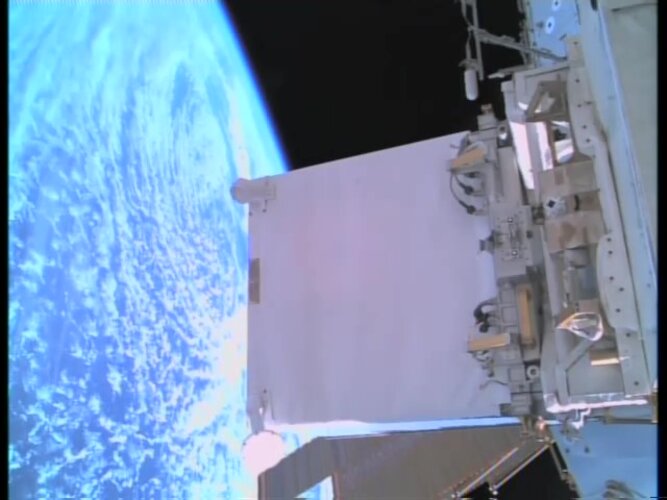
The Atomic Clock Ensemble in Space (ACES), ESA’s state-of-the-art timekeeping facility, has been successfully installed on the International Space Station, marking the start of a new chapter in space-based precision science.
Celebrating 20 years of KUBIK: a cornerstone of life science research in space
Friday, 25 April 2025 08:13
On 19 April 2025, ESA marks the 21st anniversary of KUBIK, an incubator for biological samples in space. This versatile and enduring facility has advanced our understanding of biology in space for the last two decades.
Earth from Space: French Guiana
Friday, 25 April 2025 07:00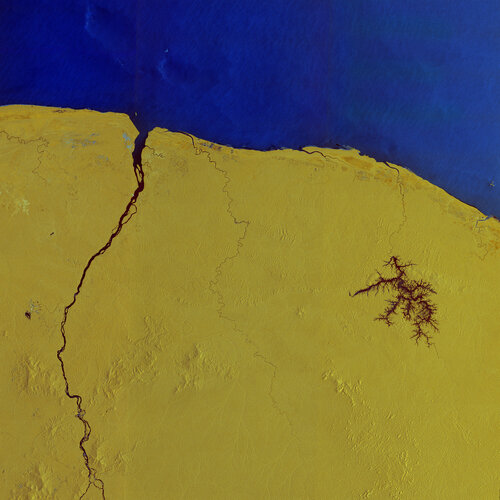 Image:
Copernicus Sentinel-1 captured this radar image over French Guiana – home to Europe’s Spaceport in Kourou, where ESA’s Biomass mission is being prepared for liftoff on 29 April onboard a Vega-C rocket.
Image:
Copernicus Sentinel-1 captured this radar image over French Guiana – home to Europe’s Spaceport in Kourou, where ESA’s Biomass mission is being prepared for liftoff on 29 April onboard a Vega-C rocket. Three Chinese astronauts blast off for Tiangong space station
Thursday, 24 April 2025 13:03 A Chinese rocket carrying three astronauts to the country's space station blasted off from its remote launch site Thursday, the latest milestone in Beijing's race to become a leading celestial power.
Beijing has pumped billions of dollars into its space programme in recent years in an effort to achieve what President Xi Jinping describes as the Chinese people's "space dream".
The world's
A Chinese rocket carrying three astronauts to the country's space station blasted off from its remote launch site Thursday, the latest milestone in Beijing's race to become a leading celestial power.
Beijing has pumped billions of dollars into its space programme in recent years in an effort to achieve what President Xi Jinping describes as the Chinese people's "space dream".
The world's Rocket Lab to Conduct Hypersonic Test Flight Under MACH-TB 2.0 Program
Thursday, 24 April 2025 13:03 Rocket Lab USA, Inc. (Nasdaq: RKLB), a key provider of launch services and space systems, has secured a new contract to launch a full-scale hypersonic test flight on behalf of the U.S. Department of Defense. The mission, commissioned by Kratos under the MACH-TB 2.0 initiative, will utilize Rocket Lab's HASTE vehicle and is scheduled to lift off from Launch Complex 2 at Wallops Island, Virginia,
Rocket Lab USA, Inc. (Nasdaq: RKLB), a key provider of launch services and space systems, has secured a new contract to launch a full-scale hypersonic test flight on behalf of the U.S. Department of Defense. The mission, commissioned by Kratos under the MACH-TB 2.0 initiative, will utilize Rocket Lab's HASTE vehicle and is scheduled to lift off from Launch Complex 2 at Wallops Island, Virginia, China selects global payloads and opens lunar samples to foreign scientists
Thursday, 24 April 2025 13:03 China has announced the selection of 10 international payloads for its upcoming Chang'e 8 lunar mission, underscoring its commitment to global collaboration in space science. The China National Space Administration (CNSA) revealed that the chosen experiments span 11 nations and regions, including a specialized project from the International Society for Terrain-Vehicle Systems.
Among the se
China has announced the selection of 10 international payloads for its upcoming Chang'e 8 lunar mission, underscoring its commitment to global collaboration in space science. The China National Space Administration (CNSA) revealed that the chosen experiments span 11 nations and regions, including a specialized project from the International Society for Terrain-Vehicle Systems.
Among the se Galaxies surged in size during early universe growth phase
Thursday, 24 April 2025 13:03 A new astronomical survey led by the University of Kansas using the James Webb Space Telescope (JWST) has delivered fresh insight into galaxy evolution during the universe's peak star-forming era known as "cosmic noon," which occurred roughly 2 to 3 billion years after the Big Bang.
The MIRI EGS Galaxy and AGN (MEGA) survey reveals that half of all the stars in today's galaxies were born d
A new astronomical survey led by the University of Kansas using the James Webb Space Telescope (JWST) has delivered fresh insight into galaxy evolution during the universe's peak star-forming era known as "cosmic noon," which occurred roughly 2 to 3 billion years after the Big Bang.
The MIRI EGS Galaxy and AGN (MEGA) survey reveals that half of all the stars in today's galaxies were born d Shockwave mapping reveals hidden plasma structures near Earth
Thursday, 24 April 2025 13:03 A team of Australian scientists has harnessed the flickering of a nearby pulsar to map invisible plasma structures within our local galactic neighborhood, offering unprecedented insight into the turbulent medium between stars. This achievement, made using the MeerKAT radio telescope, illuminates the plasma dynamics inside a rare bow shock structure and redefines our understanding of the Local Bu
A team of Australian scientists has harnessed the flickering of a nearby pulsar to map invisible plasma structures within our local galactic neighborhood, offering unprecedented insight into the turbulent medium between stars. This achievement, made using the MeerKAT radio telescope, illuminates the plasma dynamics inside a rare bow shock structure and redefines our understanding of the Local Bu Redwire boosts space-based pharma tech with new crystallizer and gold nanoparticle test
Thursday, 24 April 2025 13:03 Redwire Corporation (NYSE: RDW), a prominent force in space infrastructure innovation, has expanded its pharmaceutical research efforts in orbit with the deployment of new crystallization technology and a groundbreaking cancer-detection experiment aboard the International Space Station (ISS).
Building on the success of its PIL-BOX platform, Redwire has introduced a high-volume Industrial C
Redwire Corporation (NYSE: RDW), a prominent force in space infrastructure innovation, has expanded its pharmaceutical research efforts in orbit with the deployment of new crystallization technology and a groundbreaking cancer-detection experiment aboard the International Space Station (ISS).
Building on the success of its PIL-BOX platform, Redwire has introduced a high-volume Industrial C NASA's PUNCH Mission Captures First Images of Sun, Space
Thursday, 24 April 2025 13:03 NASA's PUNCH (Polarimeter to Unify the Corona and Heliosphere) mission successfully completed spacecraft commissioning this week, opening its instrument doors to capture "first light," the mission's first images of the Sun's outer atmosphere and the surrounding space. This is the first step in revealing new details of how the solar atmosphere unfolds and streams through the solar system. Now, mi
NASA's PUNCH (Polarimeter to Unify the Corona and Heliosphere) mission successfully completed spacecraft commissioning this week, opening its instrument doors to capture "first light," the mission's first images of the Sun's outer atmosphere and the surrounding space. This is the first step in revealing new details of how the solar atmosphere unfolds and streams through the solar system. Now, mi ELVIS imaging tech heads to space to advance life detection
Thursday, 24 April 2025 13:03 A cutting-edge holographic imaging device named ELVIS is now aboard the International Space Station, poised to transform the study of life in space. Officially known as the Extant Life Volumetric Imaging System, ELVIS is designed to deliver advanced three-dimensional views of microorganisms and cells, providing critical insights into how life endures in the harsh conditions beyond Earth.
D
A cutting-edge holographic imaging device named ELVIS is now aboard the International Space Station, poised to transform the study of life in space. Officially known as the Extant Life Volumetric Imaging System, ELVIS is designed to deliver advanced three-dimensional views of microorganisms and cells, providing critical insights into how life endures in the harsh conditions beyond Earth.
D China unveils new round of space station life science experiments
Thursday, 24 April 2025 13:03 The China Manned Space Agency (CMSA) has announced a new series of life science investigations to be conducted aboard the Tiangong space station during the Shenzhou XX crewed mission. The program includes novel biological studies involving zebra fish, planarians, and the soil bacterium Streptomyces.
For the first time, Chinese researchers will explore how planarians regenerate in space. Kn
The China Manned Space Agency (CMSA) has announced a new series of life science investigations to be conducted aboard the Tiangong space station during the Shenzhou XX crewed mission. The program includes novel biological studies involving zebra fish, planarians, and the soil bacterium Streptomyces.
For the first time, Chinese researchers will explore how planarians regenerate in space. Kn A new space age for forests – but groundwork still matters
Thursday, 24 April 2025 11:35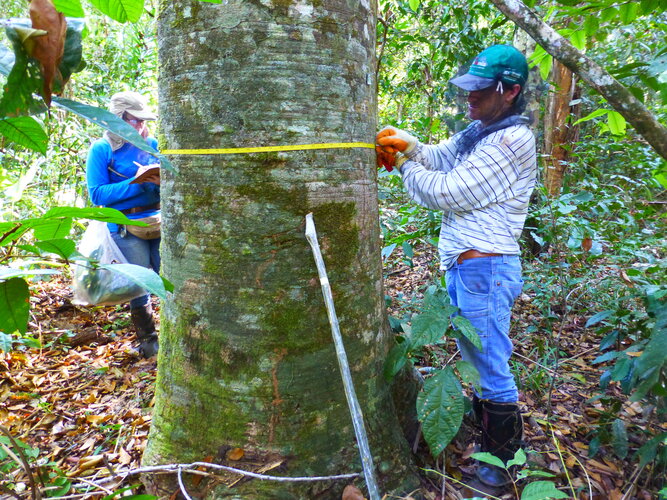
A new era of forest monitoring is quite literally taking off, ushering in what scientists are calling the ‘forest space age’. On April 29, ESA will launch its revolutionary Biomass mission, the first satellite to carry a P-band radar into space – technology that is set to transform how we understand forests and the carbon they store. Along with other space agencies’ instruments already in orbit or soon to be launched, there has never been so many ‘eyes in the sky’ focused on forests.
Yet, the work
Hovering over Europe’s flattest floor with AI
Thursday, 24 April 2025 10:26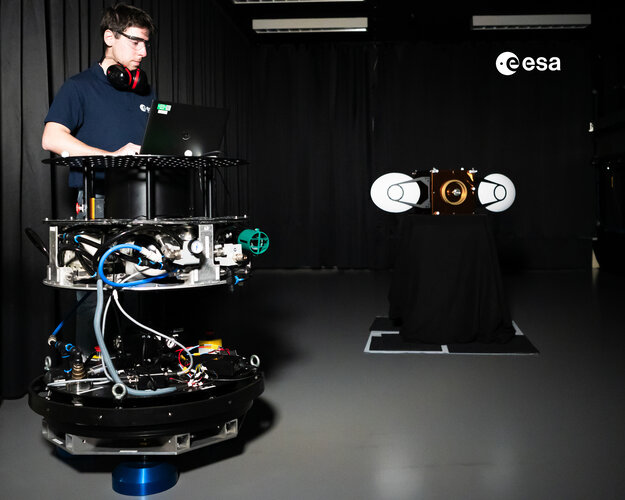 Image:
Hovering over Europe’s flattest floor with AI
Image:
Hovering over Europe’s flattest floor with AI Watch Biomass launch live
Thursday, 24 April 2025 08:50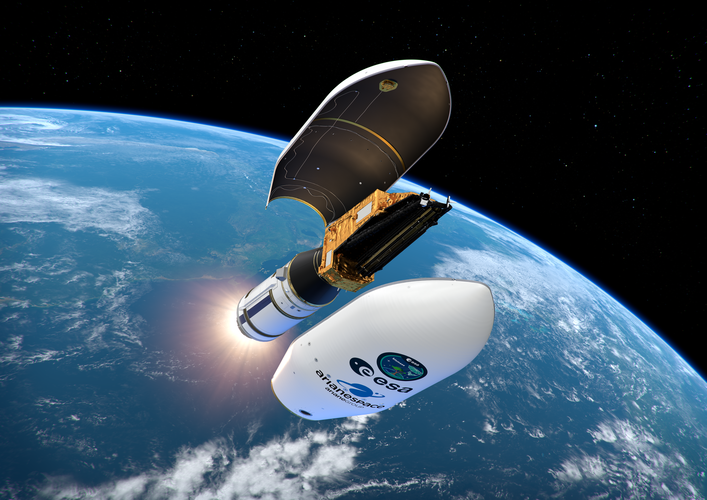
ESA's Biomass mission is on the launch pad at Europe’s Spaceport in Kourou, French Guiana. Don’t miss the live coverage of liftoff on Tuesday 29 April, on ESA WebTV. Coverage will start at 10:55 CEST with commentary live from Kourou and ESA’s European Space Operations Centre in Germany. The Vega-C rocket carrying Biomass is scheduled for liftoff at 11:15.

